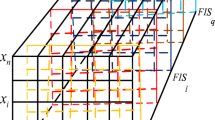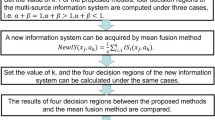Abstract
Multigranulation rough set is one class of the important models in rough set community. However, both pessimistic and optimistic rough sets have disadvantages in describing target concept. In this paper, a novel model, called weighted multigranulation fuzzy decision rough sets, is proposed. Gaussian kernel is used to compute the similarity between objects, which induces a fuzzy equivalence relation. We employ the relation to fuzzily partition the universe and then obtain multiple fuzzy granulations from multisource fuzzy information system. Moreover, some interesting properties of the proposed model are discussed. A comparative study between the proposed multigranulation model and Sun’s multigranulation rough set model is carried out. An example is employed to illustrate the effectiveness of the proposed method, which may provide an effective approach for multisource data analysis in real applications.
Similar content being viewed by others
References
Azam N, Yao JT (2014) Analyzing uncertainties of probabilistic rough set regions with game-theoretic rough sets. Int J Approx Reason 55(1):142–155
Bonikowski Z, Brynirski E, Wybraniec U (1998) Extensions and intentions in the rough set theory. Inf Sci 107:149–167
Chen JK, Li JJ (2012) An application of rough sets to graph theory. Inf Sci 201(15):114–127
Chen DG, Zhang L, Zhao SY, Hu QH, Zhu PF (2012) A novel algorithm for finding reducts with fuzzy rough sets. IEEE Trans Fuzzy Syst. 20(2):385–389
Chen Y, Kilgour D, Hipel K (2012) A decision rule aggregation approach to multiple criteria multiple participant sorting. Group Decis Negot 21:727–745
Dubois D, Prade H (1990) Rough fuzzy sets and fuzzy rough sets. Int J Gen Syst 17:191–209
Hu QH, Yu DR, Xie ZX, Liu JF (2006) Fuzzy probabilistic approximation spaces and their information measures. IEEE Trans Fuzzy Syst 14(2):191–201
Hu QH, Xie ZX, Yu DR (2007) Hybrid attribute reduction based on novel fuzzy-rough model and information granulation. Patt Recog 40:3509–3521
Hwang C, Lin M (1987) Group decision making under multiple criteria. Lecture notes in economics mathematics system. Springer, Berlin
Jia XY, Tang ZM, Liao WH, Shang L (2014) On an optimization representation of decision-theoretic rough set models. Int J Approx Reason 255(1):156–166
Jia XY, Shang L, Zhou B, Yao YY (2015) Generalized attribute reduct in rough set the-ory. Knowl Based Syst. https://doi.org/10.1016/j.knosys.2015.05.017
Kryszkiewicz M (1998) Rough set approach to incomplete information systems. Inf Sci 112:39–49
Li HX, Zhang LB, Huang B, Zhou XZ (2015) Sequential three-way decision and granulation for cost-sensitive face recognition. Knowl Based Syst. https://doi.org/10.1016/j.knosys.2015.07.040
Li JH, Mei CL, Xu W, Qian Y (2015) Concept learning via granular computing: a cogni-tive viewpoint. Inf Sci 298:447–467
Li JH, Ren Y, Mei CL, Qian YH, Yang XB (2016) A comparative study of multigranula-tion rough sets and concept lattices via rule acquisition. Knowl Based Syst 91:152–164. https://doi.org/10.1016/j.knosys.2015.07.024
Liang JY, Wang F, Dang CY, Qian YH (2012) An effcient rough feature selection algo-rithm with a multigranulation view. Int J Approx Reason 53(7):1080–1093
Liang DC, Liu D, Pedrycz W, Hu P (2013) Triangular fuzzy decision-theoretic rough sets. Int J Approx Reason 54:1087–1106
Lin GP, Qian YH, Li JJ (2012) Nmgrs: neighborhood-based multigranulation rough sets. Int J Approx Reason 53(7):1080–1093
Lin GP, Liang JY, Qian YH (2013) Multigranulation rough sets: from partition to cover-ing. Inf Sci 241:101–118
Lin YJ, Li JJ, Lin PR, Lin GP, Chen JK (2014) Feature selection via neighborhood multigranulation fusion. Knowl Based Syst 67:162–168
Lin GP, Liang JY, Qian YH (2015) An information fusion approach combining multigranulation rough sets and evidence theory. Inf Sci 314:184–190
Lin G, Liang J, Qian Y et al (2016) A fuzzy multigranulation decision-theoretic approach to multi-source fuzzy information systems[J]. Knowl Based Syst 91:102–113
Liu D, Li TR, Ruan D (2011) Probabilistic model criteria with decision-theoretic rough sets. Inf Sci 181(17):3709–3722
Liu D, Li TR, Liang DC (2014) Incorporating logistic regression to decision-theoretic rough sets for classification. Int J Approx Reason 55(1):197–210
Liu D, Liang DC, Wang CC (2015) A novel three-way decision model based on incomplete information system. Knowl Based Syst 2015(07):036. https://doi.org/10.1016/j.knosys
Moser B (2006) On representing and generating kernels by fuzzy equivalence relations. J Mach Learn Res 7:2603–2630
Pawlak Z (1991) Rough sets. Kluwer Aca-demic Publishers, Dordrecht, Theoretical aspects of reasoning about data
Pawlak Z (1982) Rough sets. Int J Comput Inf Sci 11:341–365
Pedrycz W (2002) Relational and directional aspects in the construction of information granules. IEEE Trans Syst Man Cybern Part A 32(5):605–614
Pedrycz W (2013) Granular computing: analysis and design of intelligent systems. CRC Press/Francis Taylor, Boca Raton
Qian YH, Liang JY, Yao YY, Dang CY (2010) Mgrs: a multigranulation rough set. Inf Sci 180:949–970
Qian YH, Li SY, Liang JY, Shi ZZ, Wang F (2014) Pessimistic rough set based decisions: a multigranulation fusion strategy. Inf Sci 264(20):196–210
Qian YH, Zhang H, Sang YL, Liang JY (2014) Multigranulation decision-theoretic rough sets. Int J Approx Reason 55(1):225–237
Qing-hua Hu, Lei Zhang, De-gang Chen et al (2010) Gaussian Kernelbased fuzzy rough sets: mode, uncertainty measures and applications [j]. Int J Approx Reason 51:453–471
Sang YL, Liang JY, Qian YH (2015) Decision-theoretic rough sets under dynamic granulation. Knowl Based Syst. https://doi.org/10.1016/j.knosys.2015.08.001
Shawe-Tayor J, Cristianini N (2004) Kernel methods for patternn analysis. Cambridge University Press, Cambridge
She YH, He XL (2012) On the structure of the multigranulation rough set model. Knowl Based Syst 36:81–92
Slezak D, Ziarko W (2005) The investigation of the bayesian rough set model. Int J Approx Reason 40:81–91
Slowinski R, Vanderpooten D (2000) A generalized definition of rough approximations based on similarity. IEEE Trans Knowl Data Eng 12:331–336
Sun B, Ma W (2015) Rough approximation of a preference relation by multi-decision dominance for a multi-agent conflict analysis problem. Inf Sci 315:39–53
Sun B, Ma W, Qian Y (2017) Multigranulation fuzzy rough set over two universes and its application to decision making[J]. Knowl Based Syst 123:61–74
Xu WH, Wang QR, Zhang XT (2011) Multigranulation fuzzy rough sets in a fuzzy tolerance approximation space. Int J Fuzzy Syst 13(4):246–259
Yang S, Yan S, Zhang C et al (2007) Biliear analysis for kernel selection and nonlinear feature extraction. IEEE Trans Neural Netw 8:1442–1452
Yang HL, Liao XW, Wang SY, Wang J (2013) Fuzzy probabilistic rough set model on two universes and its applications. Int J Approx Reason 54:141–1420
Yang XB, Qi Y, Yu HL, Song XN, Yang JY (2014) Updating multigranulation rough approximations with increasing of granular structures. Knowl Based Syst 64:59–69
Yao YY (2001) Information granulation and rough set approximation. Int J Intell Syst 16(1):87–104
Yao YY (2010) Three-way decisions with probabilistic rough sets. Inf Sci 180(3):341–353
Yao YY (2011) The superiority of three-way decisions in probabilistic rough set models. Inf Sci 181(6):1080–1096
Yao YY, Wong SKM (1992) A decidsion theoretic framework for approximating concepts. Int J Man Machine Stud 37:793–809
Yao JT, Li HX, Peters G (2014) Decision-theoretic rough sets and beyond. Int J Approx Reason 55(1):99–100
Yu H, Liu ZG, Wang GY (2014) An automatic method to determine the number of clus-ters using decision-theoretic rough set. Int J Approx Reason 55(1):101–115
Zadeh LA (1998) Some reflections on soft computing, granular and their roles in the conception, design and utilization of information/intelligent systems. Soft Comput 2:23–25
Zhang HY, Zhang WX (2009) Hybrid monotonic inclusion measure and its use in measuring similarity and distance between fuzzy sets. Fuzzy Sets Syst 160:107–118
Zhang WX, Liang Y, Wu WZ (2003) Information system and knowledge discovery[M]. Science press, Beijing
Zhao SY, Tsang CC, Chen DG (2009) The model of fuzzy variable precision rough sets. IEEE Trans Fuzzy Syst 17(2):451–467
Zhao SY, Tsang CC, Chen DG, Wang XZ (2010) Building a rule-based classifier by using fuzzy rough set technique. IEEE Trans Knowl Data Eng 22(5):624–638
Zhao SY, Chen H, Li CP, Zhai MY (2013) Rfrr: robust fuzzy rough reduction. IEEE Trans Fuzzy Syst 21(5):825–841
Ziarko W (1993) Variable precision rough sets model. J Comput Syst Sci 46(1):39–59
Acknowledgements
This work was supported by the National Natural Science Foundation of China under Grants 61976027, 61572082 and 61673396, the Foundation of Educational Committee of Liaoning Province (LZ2016003), the Natural Science Foundation of Liaoning Province (20170540012, 20170540004).
Author information
Authors and Affiliations
Corresponding author
Additional information
Communicated by V. Loia.
Publisher's Note
Springer Nature remains neutral with regard to jurisdictional claims in published maps and institutional affiliations.
Rights and permissions
About this article
Cite this article
An, L., Ji, S., Wang, C. et al. A multigranulation fuzzy rough approach to multisource information systems. Soft Comput 25, 933–947 (2021). https://doi.org/10.1007/s00500-020-05187-x
Published:
Issue Date:
DOI: https://doi.org/10.1007/s00500-020-05187-x




